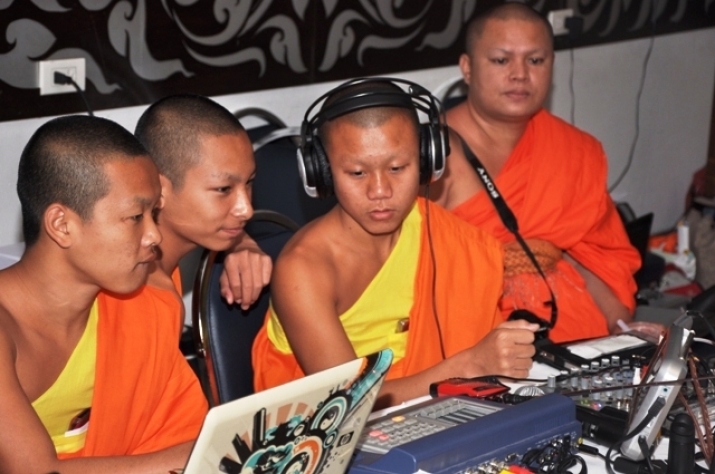NEWS
Symposium of Asian Scholars, Media Experts Seeks Mindful Model for Journalism
 Symposium seeks to apply the teachings of Buddhism and other Asian religions for a mindful, more compassionate approach to journalism. From indepthnews.info
Symposium seeks to apply the teachings of Buddhism and other Asian religions for a mindful, more compassionate approach to journalism. From indepthnews.infoAsian scholars and media experts gathered in Bangkok from 14–15 December for a symposium titled “Mindful Communication for ASEAN Integration” to examine how mindful communication can be adapted for use in 21st century journalism as means of creating media aimed at promoting harmony rather than conflict.
The forum is part of a process to develop a new journalism training curriculum for Asia that incorporates concepts and approaches from Buddhist, Confucian, and Hindu teachings, to foster harmony, protection of the environment, respect for cultural diversity, and economic models that focus on self-sufficiency. It was hosted at the Communication Arts Faculty of Chulalongkorn University in association with the UNESCO International Program for the Development of Communication (IPDC).
Phuwadol Piyasilo Bhikku, a Theravada monk in the Thai forest tradition, said in his opening speech that the form of mindfulness commonly practiced in the West was “a bit problematic” as the focus was mainly on stress reduction at the individual level. “Mindful practice in the West tries to be secular and is practiced without having any religious values in it,” he observed. “You need to accompany it with panna (wisdom). Without this moral wisdom, the practice will not be enough to drive us in the right direction to help society.” (IDN-InDepthNews)
Bhikku Phuwadol, a former journalist and a communication arts graduate from Thailand’s Chulalongkorn University, noted that because Buddhism is rooted in the eradication of suffering by being mindful of the suffering, applying these traditional philosophies should enable journalists to report on issues without promoting division and conflict.
Speakers at the event noted that the ancient philosophies contained within Buddhist, Confucian, and Hindu teachings remained valid in the modern world, yet many young Asians viewed the ancient teachings as irrelevant to their lives.
Prof. Supaporn Phokaew of Chulalongkorn University’s Communications Arts Faculty argued that a proper understanding of loving kindness and compassion towards all living beings—a fundamental aspect of Buddhism—could equip journalists with empathy towards the people they reported on. “We teach students writing and speaking skills, but not listening skills,” she said. “We need to introduce teaching deep listening skills to practice mindful communication. We need to listen to people to relate to society.” (IDN-InDepthNews)
The dean of Bhutan’s Royal Thimpu College, Dorji Wangchuk, pointed out that the “fourth estate” model of Western journalism was fast disappearing due to the advent of social media, which is changing the way narratives are told and spread and transforming social interaction. He argued that Asia should develop a media model based on achieving contentment within society. “Bhutan is building a form of journalism that advocates contentment, community, compassion and core values of Bhutanese society,” he said. “The middle-path journalism will promote news as a social good and not as a commercial commodity, and will help build communities, consensus and contentment and not thrive on conflicts, controversies and commercialism.” (IDN-InDepthNews)
Thai author and poet Khunying Chamnongsri Hanchanlash argued that journalistic integrity would come naturally to a mind trained in the Buddhist practices of right conduct (sila), composure of mind (samadhi), and insight (panna), noting, “For communication, [mindfulness] is an exploration of what arises in one’s own mind, the emotions, the bias, the motive, before the actual act of communication. It is the space of ‘knowing’ in which one is able to decide rather than react.” (IDN-InDepthNews)
“The journalist has a critical role to convey that communities and spiritual leaders of the world can play an important role in addressing the enormous [development] problems [of the human race],” said Prof. Kwangsoo Park, director of the Research Centre of Religions at South Korea’s Wonkwang University. “The journalists should develop their interest in new ethical values to benefit the weak and poor people in the global economy [and point out] it is necessary for all of us to change our lifestyles [to avoid] a global financial crisis.” (IDN-InDepthNews)
See more
ASIAN SCHOLARS CRAFTING A NON-ADVERSARIAL APPROACH TO JOURNALISM (IDN-InDepthNews)
Ancient Asian wisdom to feature in review of ASEAN journalism education (UNESCO)














